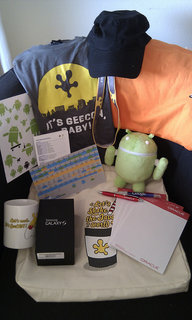 In less than a month GeeCON is happening again. It is a great three day conference for Java and JVM developers. And you should go there! If you are from Vienna, Austria, it is especially easy and cheap to go there. But I am getting ahead of myself...
In less than a month GeeCON is happening again. It is a great three day conference for Java and JVM developers. And you should go there! If you are from Vienna, Austria, it is especially easy and cheap to go there. But I am getting ahead of myself...Why attending a conference?
Attending a conference has many benefits. Kevin Benore bas summarised some of them: Learning, networking, professional advancement and "Keeping the Flame Alive". Learning new things is a major reason to attend for many people. While you could watch all the content online at home, I have not met anybody who took two or three days off to do that. Also a conference gives you diverse content, sometimes you end in a talk about a topic you have no idea about. I bet that you would not watch such a talk online - why should you?. So the "change of scene" is a very important side effect of a conference. And of course there is swag - or how I call it - loot ;-). I consider swag less important and rather pay less for the conference, but the occasional shirt or mug are great mementos of past conferences.
GeeCON
GeeCON is my favourite conference and I go there every year since 2010. (I missed the first version in 2009 and I am still sad about it. But I have been to more GeeCONs that some of the organisers themselves.) I go there even when I am very busy. I am never disappointed by the content presented, see my extra short summary of GeeCON 2012. To make sure for yourself, I recommend checking out the GeeCON 2016 speaker line-up and the GeeCON Vimeo channel containing all past presentations since 2011. For this year I have the resolution to share the goodness and bring more people (from Vienna) with me, which is why I wrote this little advert.
Cost and Effort of Travelling
Some people like travelling, others do not. I am not fond of business trips and consider them a necessary evil. Kraków, the Polish city where GeeCON takes place, has an airport nearby. There are direct flights to different European airports, e.g. Berlin. From Vienna, where I live, it is even easier to reach using the night train. (I apologise for the following excessive details, but my main goal is to encourage developers from Vienna to join me.) The night train 406 leaves from Vienna Hauptbahnhof every day at 22:50 and arrives the following day at 7:00 in Kraków. When you book early, you might only pay 55 Euro for the special offer "Sparschiene". The night train is great because I can still be at work the day before the conference and I stay one night less at the hotel which saves me money again. The same is true for the return trip, train 402, which leaves Kraków each evening around 22:00.
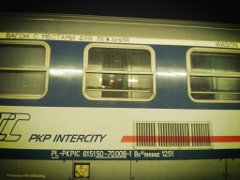 For the remaining two nights I usually book a cheap hotel next to the main railway station Kraków Glówny, e.g. ibis budget Krakow Stare Miasto, where I can stay for 40 Euro per night. I like the ibis because I can drop my luggage after arriving in the morning. Also one of the bus lines to the venue stops right before the ibis, reducing the hassle of travelling.
For the remaining two nights I usually book a cheap hotel next to the main railway station Kraków Glówny, e.g. ibis budget Krakow Stare Miasto, where I can stay for 40 Euro per night. I like the ibis because I can drop my luggage after arriving in the morning. Also one of the bus lines to the venue stops right before the ibis, reducing the hassle of travelling.Value for Money
Depending on when I book, the total cost for a GeeCON visit (from Vienna) is between 380 and 440 Euro, excluding dinner. This is a ridiculous price for the value of a great three day conference. Because of the cheap travel, even other great community conferences like Devoxx cannot compete with GeeCON.
Training Budgets
The cheap total price enables several options.
- For employees now is the time to ask for your training budget. If you work for a reasonable company, there is some money for training and education for sure, however it may be small. The small cost might still make it possible to go to GeeCON on company expenses. Go, ask your manager now!
- In my experience money is less of a problem than the time not doing actual work. In such situations I offer to take the days off. As an employee, taking three days off is easier for me than paying 500 Euro from my wallet. This is also a fair approach as education is both the employer's and employee's obligation. So if your boss is unable to send you to GeeCON on company expenses, offer to take three days off to compensate and to show that you are serious about your continuing education. Taking the night train - while not very convenient - pays off again, because there are no extra days needed for travel.
- If you are independent, your training budget is exhausted or your boss is a moron, then just take the days off and pay for the whole conference on your own. I am very bad at bargaining and hate arguing with managers, so I took this option several times in the past. You might use your training budget to go to a really expensive conference like JavaOne and pay for cheaper ones yourself.
As you can see - if you are from Vienna - it is easy and cheap to go to GeeCON. I would like to take you with me because I want more of us to participate and learn and have fun there. I am sad that there are only three participants from Austria attending a great international event with more than 1000 participants. So register for GeeCON now!. If you have any problems or doubts or if you need help in organising your trip, please get in touch with me.
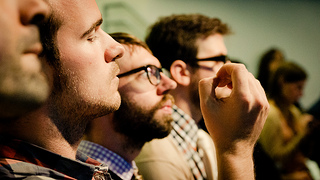
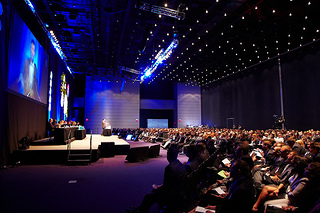

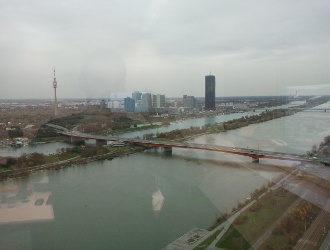 Quality important is. Fight for it you must ;-)
Quality important is. Fight for it you must ;-)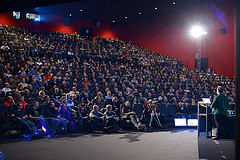
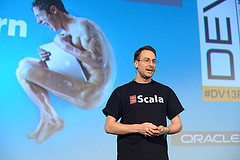
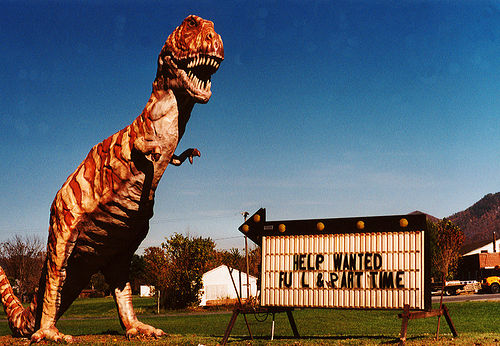
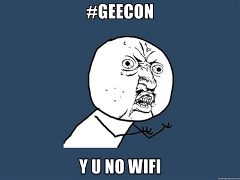
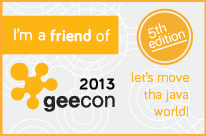

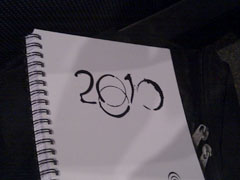 Day 1
Day 1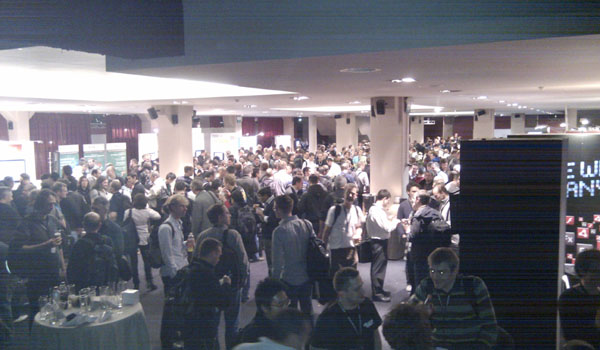
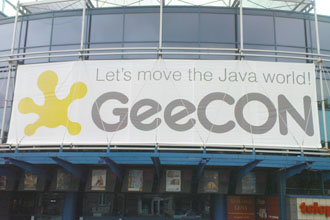 The quality of the presentations was excellent. I really liked all of them. This was the most important thing to me because I went there to see the presentations. I didn't care whether the Wi-Fi was slow or if the food was not particularly tasty. I attend conferences to see new things. (Well the food was nothing special, but who cares?) I have attended other conferences before and there were usually a few presentations that were boring or not very good. However, this was not the case with GeeCON! I was pleasantly surprised. Kudos to the GeeCON team and all the speakers. You did a great job.
The quality of the presentations was excellent. I really liked all of them. This was the most important thing to me because I went there to see the presentations. I didn't care whether the Wi-Fi was slow or if the food was not particularly tasty. I attend conferences to see new things. (Well the food was nothing special, but who cares?) I have attended other conferences before and there were usually a few presentations that were boring or not very good. However, this was not the case with GeeCON! I was pleasantly surprised. Kudos to the GeeCON team and all the speakers. You did a great job.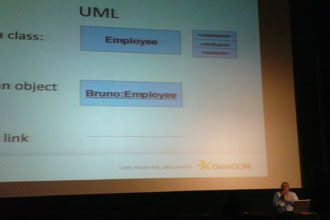

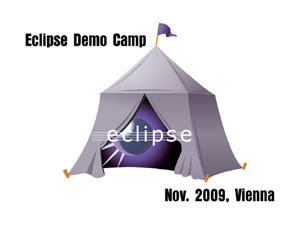 We lined up with the local
We lined up with the local 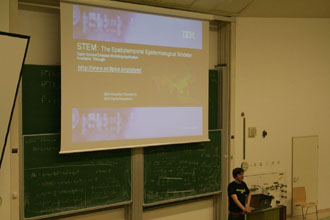
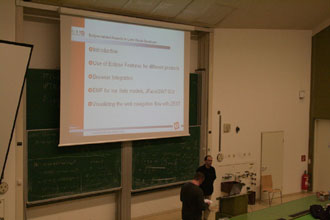 Next the
Next the 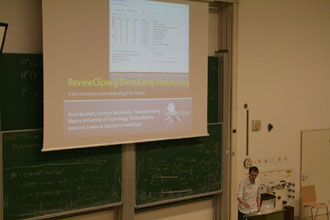 The Eclipse plugin
The Eclipse plugin 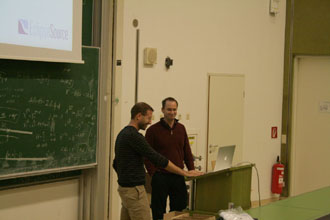 Chris Aniszczyk and Jeff McAffer are both seasoned speakers and furthermore good entertainers. In a whirlwind tour of the
Chris Aniszczyk and Jeff McAffer are both seasoned speakers and furthermore good entertainers. In a whirlwind tour of the 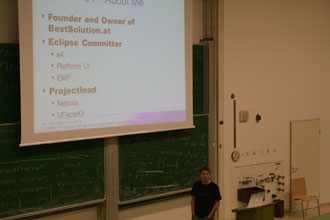 The last presentation of the first block was about
The last presentation of the first block was about 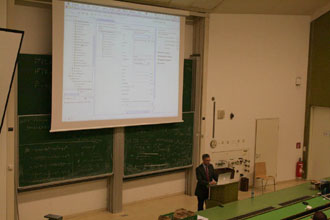 Our "modelling track" was opened by Robert Handschmann's demo of the
Our "modelling track" was opened by Robert Handschmann's demo of the 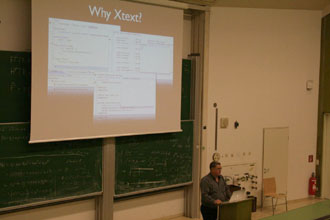 After that
After that 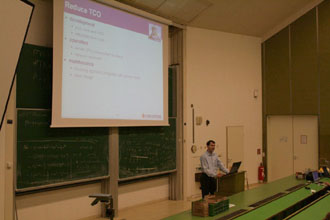 Next Karl Hönninger gave a short demo of
Next Karl Hönninger gave a short demo of 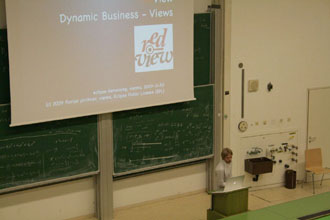 Then Florian Pirchner showed how they had created dynamic RCP Views enriched with Riena Ridgets that interpret their EMF model and update in real-time:
Then Florian Pirchner showed how they had created dynamic RCP Views enriched with Riena Ridgets that interpret their EMF model and update in real-time: 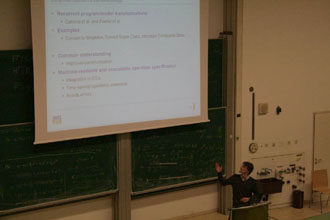 Unfortunately I was not able to attend the last presentation given by Philip Langer about
Unfortunately I was not able to attend the last presentation given by Philip Langer about 














